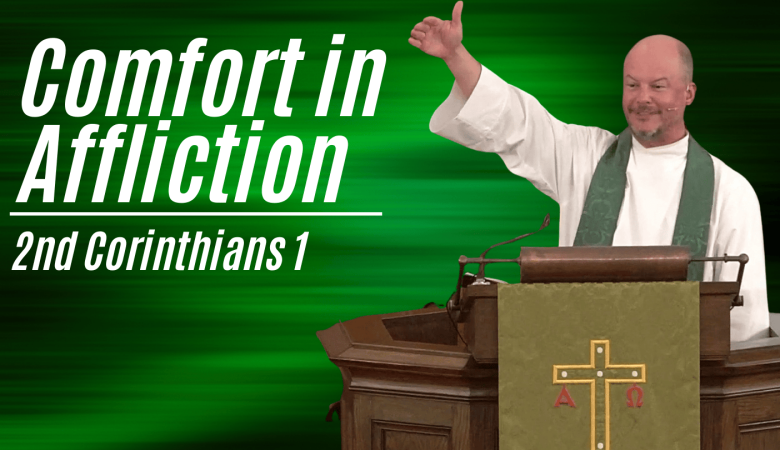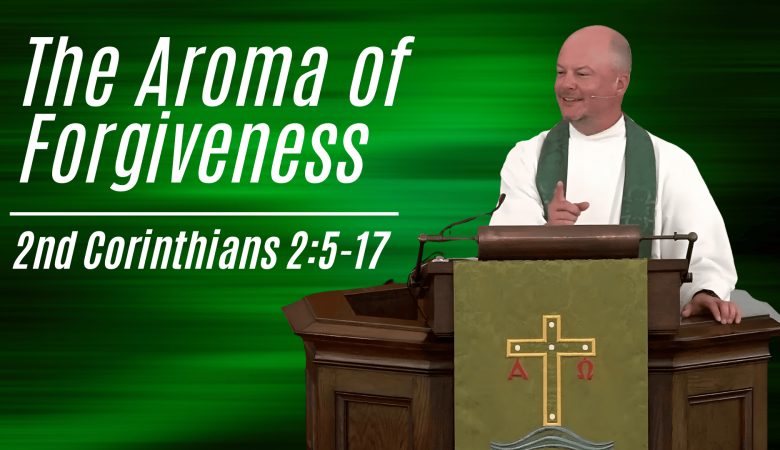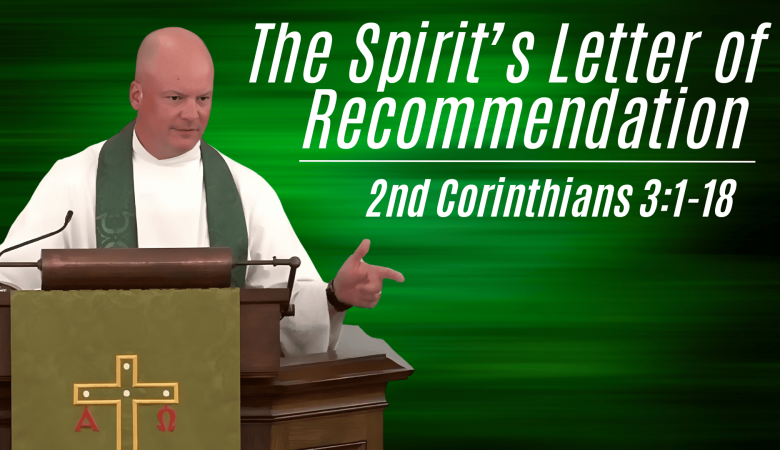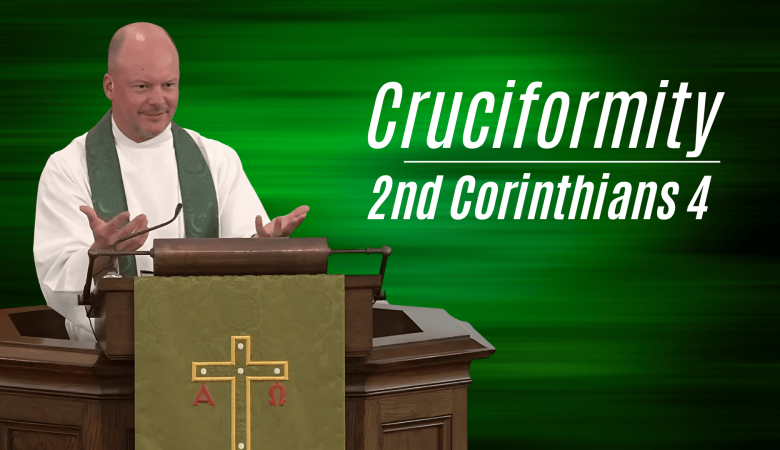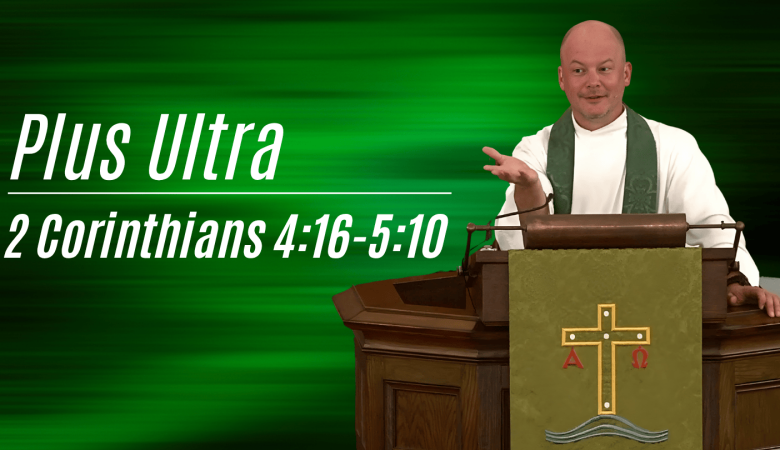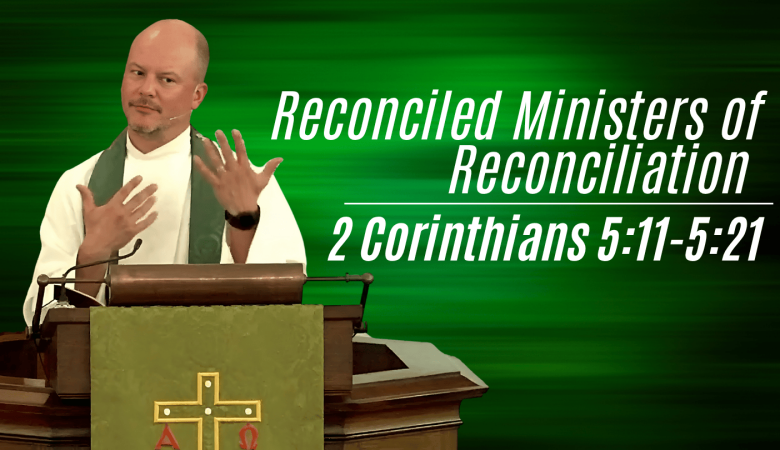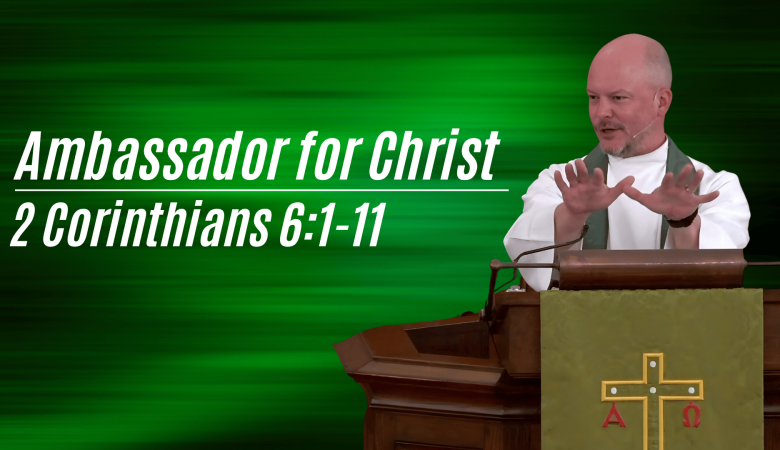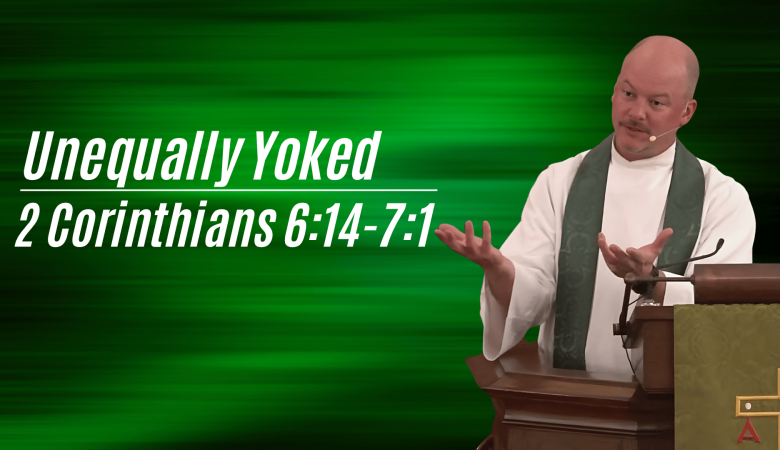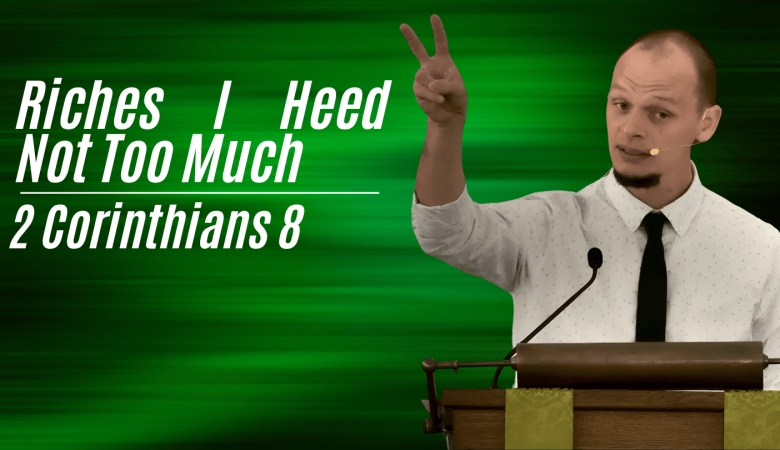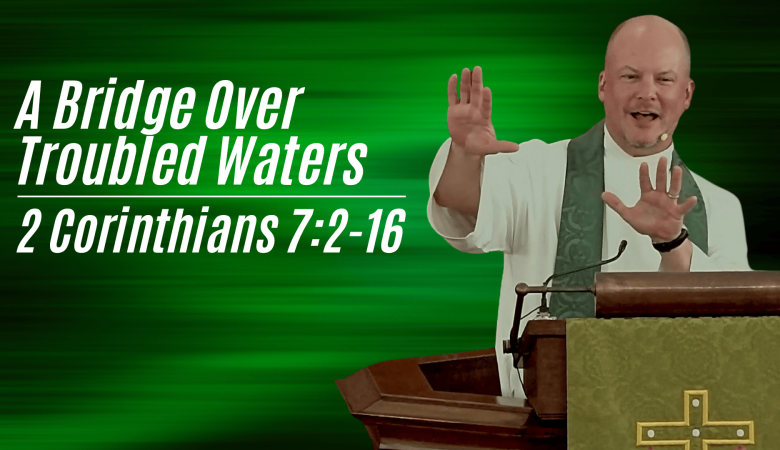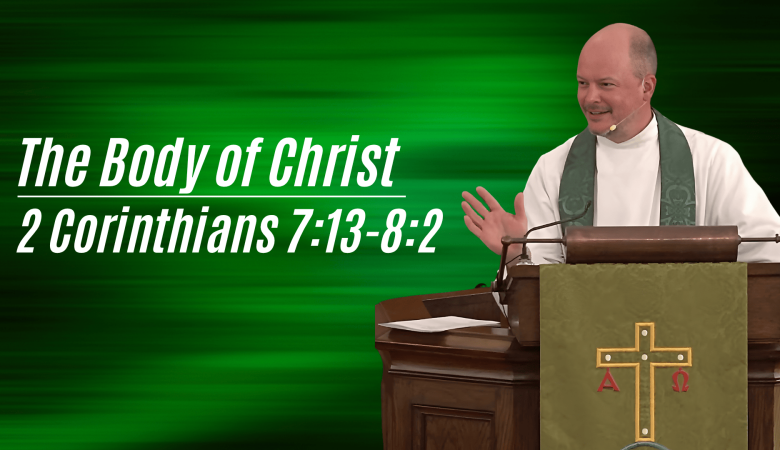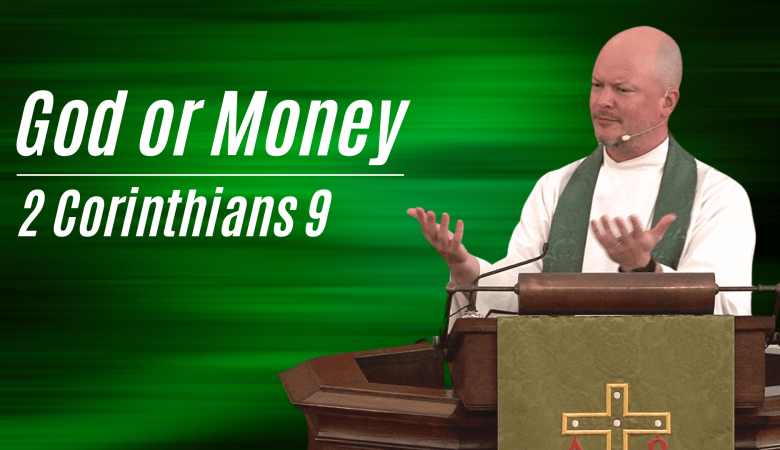Series: Power in Weakness
Stay in Your Lane
November 16, 2025 | Jed Stalker
Passage: 2 Corinthians
Summary
Conflict is inevitable, but Christians can handle it differently than the world does. Paul's response to opposition in Corinth shows us how to fight spiritual battles without using worldly tactics. Instead of comparing ourselves to others, manipulating situations, or boasting in our abilities, we should embrace the meekness and gentleness of Christ. This means staying in our God-assigned lane, working diligently within our calling, and being willing to lose by worldly standards to win by God's standards. When we boast in Christ rather than ourselves and seek His approval over human recognition, we find true rest and purpose while strengthening both our faith and the church.
Transcript
Please pray with me. Oh Lord God, you are good. Your mercy endures forever. We thank you, O Lord, for coming to us in such kind ways. Through your preached word, through the sacraments, we ask that you would enrich us. Help us to know and to love and to treasure you better for our time together. This morning we pray these things in Jesus name. Amen.
I want to begin our discussion of the Apostle Paul's letter to the Corinthians with a quote from Harrisburg native and former Philadelphia Eagle Lashawn McCoy. Let's go. Yes. Who apparently attended the Seventh Day Adventist school on her street until he was in eighth grade. And that's like a block from my house, so we're practically neighbors. Anyway, Shady McCoy is one of the more beloved running backs in Eagles history, but in 2015, he was traded away from the team by recently hired coach Chip Kelly. As a Sports Illustrated article put it, this was a major part of, quote, the coach exerting his control of or putting his stamp on the roster. So Kelly, the coach, wanted to remake the Eagles in his own image, and McCoy became sort of a casualty of that situation.
One of the more interesting parts of this whole story is Kelly's feud with Howie Roseman, the then and current general manager. So Kelly was not able to outright fire Roseman because the owner, Jeffrey Lurie, liked the guy a lot. But he did have Roseman's desk removed from the building. He put him with the marketing team he banned. So Roseman, the general manager, that's the guy who officially declares who's on the team and who isn't. He banned that man from Eagles practices. In an interview later, McCoy claimed that his own trade and Roseman being shut out from all player interactions was because, quote, this dude, that is Chip Kelly, was wanted power so bad he was willing to do whatever he needed to get it. The happy ending to this story is that Kelly was fired shortly afterwards, my neighbor Shady retired with the Eagles, and Roseman has two super bowl rings and counting. Go Birds.
I bring this up not because any of the characters that I've mentioned are noted Bible experts, but instead to show that the type of conflict that Paul is talking about here in the 10th chapter of his letter has not gone from the earth. It is not unbelievable. It happens all the time, publicly, in high places, and I suspect it happens secretly in our own hearts as well.
So let's think about the broad context of the book. We've been through the bulk of 2 Corinthians now. Well, in chapter 10, there's sort of a Discernible change in tone. The apostle becomes very tense, as it were, specifically about his apostolic authority. You can see this in most of the beginning of that chapter, right, which people in Corinth apparently had been challenging while Paul has been away. This changed tone continues on through the end of the letter. And it's such a marked change that some scholars suggest that chapters 10 through 13 are actually a different letter. And it sort of got added to the end of this other letter almost by accident, like an appendix or something. I don't see any compelling reason to adopt this theory. Letter writers are allowed to change tone when they want to. And actually, I think it makes a lot of sense that Paul would have this sort of kindly pastoral tone while he's asking for money and as he does in chapters eight and nine, and then gets a little bit fiercer as he deals with the other stuff on the docket, as it were.
So in any case, here in chapter 10, Paul shows that he's ready to do battle. New Testament scholar David Allen Black says that Paul's quote, change in tone came because he was speaking to a still rebellious group in church. And what seems like happened is that between the writing of first and second Corinthians, a new group of people had moved into the church in Corinth, which is the church Paul had founded. We can read about this in Acts 18. And this new group has been trying to discredit Paul so as to gain more influence on the church's movements and life, social life, apparently together as distinct from Paul. We don't know anything about these guys except what Paul writes about them. But scholars generally agree, based on internal evidence, they are people with a Jewish background who have at least some Greek education. That is, they are people very like Paul himself. And perhaps because they're like Paul in their education and their background, they feel confident they can beat Paul at his own rhetorical games.
So the way Paul goes about arguing against this renegade group here in chapter 10 is pretty remarkable. There's so much here and there's so many different topics that are fascinating that I feel like there's no way to do justice to all the different things Paul is saying. Looking at this chapter, I feel the same way as when I go to Aldi's and presumptuously, again, having never learned from my mistakes, I think, I don't need a cart. I'm just getting a few things. And by the time I get to the end, I'm, like, balancing things on the things that I'm balancing in my elbows and Trying to hold them with my chin. There's just a lot of stuff in here.
Look at this list of topics Paul brings up. Spiritual warfare and taking every thought captive to Christ. That's verses 2 through 5. There's proper church authority in verses 6 through 11, not comparing oneself with others in verse 12, and then staying within one's proper limits in verses 13 through 18. This chapter is jam packed with really interesting material. A good preacher, not me necessarily, but a good preacher could give you a full sermon on each one of these subtopics. Books have been written on them. But Paul doesn't present these different topics as separate items. They're all part of his one argument. So our task today is going to be to try to make sense of all of these different strong flavors of topics and not get distracted into just dealing with one of them, but instead to try to see how they all fit into Paul's purpose together and what we can learn from that practically.
Okay, but before I'm strong and disciplined in this exegetical way, I want to take a moment and read this great quote from the very funny and very profound Anne Lamont. It corresponds to verse 12 in here she says, don't compare your insides to other people's outsides. It'll just make you worse than you already are. And I think that's just very needed wisdom for us in this world. I love the language of the King James Here in verse 12 it says, Comparing themselves among themselves, they are not wise. So this is just a minor point of application for us all before we dive into the argument. Friend, be wise. Don't compare your internal lived experience with what you must feel like it's like to be somebody else that who you admire or envy. That's a good way to make yourself crazy. Diversion over.
So back to history. Paul had once had a good relationship with the Corinthians. And then there was this rough relational period. He has rejoiced back in chapter seven that this relationship seems to have been renewed. And now that the relationship is renewed, he's going to address the people who have been making life difficult for him in the Corinthian church.
So what we will hear when we get to chapter 11 is that these guys are either calling themselves or just behaving as super apostles. So Paul's an apostle, but these guys are super apostles. That, at least is what Paul uses as a derisive term against them. And all of the individual sections of this argument Here in chapter 10 must be responses to the their claims about his behavior. So for instance, if Paul says he doesn't dare to classify himself or compare himself with some of those who are commending themselves, verse 12, it must mean that these guys, these other guys, are making lots of comparisons in order to tear Paul down and also commending themselves to show off how great they are.
So what I want to say today, my thesis this morning is based on Paul's broad argument. So Paul shows us in this passage how a person who identifies with Christ can handle conflict. And my sub points today are really simple. When we experience interpersonal conflict, and we will, that is, strain between ourselves and other people, we want to, point one, not behave according to the flesh as Paul says in verse three, but instead point two, we want to behave in a countercultural way, like Paul himself. And then we want to behave in that way. Why? Because point three, it will be better for us and the church if we do so.
So point one, don't behave like the bad guys. That's obvious. It's also way too simple. I think that unless we're willing to sympathize with Paul's opponents a little bit here, we're going to miss the strength of what Paul is saying and perhaps how it's going to be painfully applicable in our own lives. So while these mysterious bad guys are in fact the bad guys, we want to be Team Paul on this one, right? Consider this. Did they think they were the bad guys? Obviously not, right? It's almost a psychological impossibility, right? Consider these are guys with a Jewish background who have some Greek education. What purpose would there be in faking Christianity? They don't have a lot to gain, right? In their society. They would be in some danger, right? One would think socially and also physically, as Paul himself was, if they were faking this Christianity. So probably these guys thought they were doing the right thing. They thought they knew how to help the Corinthian church to run itself. Well, it's just that they were doing it wrong.
And that's the problem with moralism, isn't it? The preacher stands up here and says, don't be bad. And we all sort of nod our heads. But the problem with that is we're sinners, right? We're people who don't know how to be good. We're people who think we know how to do good, but actually we do bad doing it right. Think back to Chip Kelly. The guy wasn't a secret agent for the Cowboys. As far as we could tell, he was a bad coach, not because he was trying to be, but because he thought in order for him to be a good coach, he had to have total control over the team. And in order to get that control, he was willing to do things that seem in retrospect to be obvious, to be cruel and manipulative and lose him the respect of the players.
So if we put ourselves in the position of people who want to do right, but who are willing to do morally questionable things to get there, then I think we'll be able to see what Paul is really arguing against. Think about what these guys are saying to each other, right? When the other Corinthians, the sort of regular Corinthians are coming back to them in support of Paul. The think about it, they're saying to each other, well, you've got to break some eggs to make an omelet. They're saying to themselves, sometimes you just got to step on a few toes, right? This is the way the world is. I'm just being a realist. And we can say these things ourselves, can't we, in our workplaces? Can we say them in the church? Can we say them in our own families?
So children, especially my children, this applies to you as well. Do you ever put your siblings down so that you feel better? Do you ever choose to hang out with who to hang out with at school because they have say, more power to make decisions about what games get played during recess? Husbands and wives, do you ever play power politics with each other? Do you allow yourself into slip into manipulation rather than dealing with your wife or your husband? With Christ like kindness, do we wage our wars according to the flesh? It's really easy to do.
Paul says if we don't take every thought, every thought captive to Christ, we will fall into the temptation to fight according to the rules laid down by the devil rather than the Lord. Thoreau talks about people who quote as they rarely make moral distinctions, are as likely to serve the devil without intending it as God. I suggest we don't want to be those guys. Let's make some moral distinctions.
So Paul cautions, let him that boasts boast in the lord. That's verse 17. This is what the Corinthian faction is not doing. They're boasting in something other than than the Lord. They're boasting in their churchly ability. And this is a temptation for us, right? There's a real temptation for church people especially to stop boasting in Christ and start boasting in what we do for Christ. And if we do that, we'll start comparing ourselves with one another. We'll start looking over other people's shoulders to see how much better we're doing than they are, and we'll start feeling underappreciated. Do you see how much venom can creep into our relationships if we let the focus slip from Christ to ourselves?
So all that was point one. Don't be like the bad guys. But note that you often are like the bad guys. How about that? And here's the actually frightening thing about this whole thing. If we persist in acting like the bad guys here, we might win these methods. They do get results. But even if we win whatever battle we happen to be in at the time, we might wreck our faith, right? This is kind of a big deal.
So what do we need to make. What do we need to do to make sure we don't get this wrong? We need to, as Paul says in his first letter to the Corinthians, follow Paul as Paul follows Christ. That's point two. Don't be like the bad guys. Be like Paul instead. And the way that we need to do that is to, as the saying goes, stay in our lane. Stick with me.
Let's look at the language in the middle of this chapter, verse 13. It says we will not boast beyond limits, but will boast only with regard to the area of influence God assigned to us. Jump down to verse 15. We do not boast beyond limit in the labors of others. But our hope is that as your faith increases, our area of influence among you may be greatly enlarged. So we may preach the gospel in lands beyond you without boasting of work already done in another's area of influence. That phrase area of influence comes up three times in a four verse span. That phrase in each case is translating the same Greek word. It's canoni. That's the word from which we get our word, canon. As in the canon of scripture. It can mean a rule or a way of life. Area of influence appears to be just fine as a translation. But this is what's really interesting to me. One of the ways that this term is used in the broader Greek speaking world is as a technical term in athletics.
Listen to this quote. The metaphor that Paul is using is that of the athletic contests for which Corinth was renowned. In the games, a course or a lane was measured out for each of the runners which was marked by a line canon. The lane measured out by God. For Paul was the one which led him to Corinth. And so metaphorically, this is what Paul is saying. He's saying, I have stayed in my Lane, you stay in your lane, right? Paul is running his own race, which is a metaphor he uses multiple times. And these super apostles are coming in here and trying to trip him. They should find their own course to run.
So in this metaphor, Christ is the one who has laid the course for Paul. And by implication, he's also led a course for each of us. He has a race for us to run. He has a job for each of us to do. And his burden is light and his yoke is easy. Why? Well, because Christ himself, who knows us and loves us, has assigned us to it. And to rest content with his plan is the best way to our own happiness and the usefulness of the people that we love.
And here's where I want to just glance at our broader culture and say that contentment and this willingness to stay in our own that Paul is displaying here is almost an act of defiance right now, right? Think about what our culture says. Get more, do more, be more. You're important. Act like it. Get a bigger car. Make people notice you. This is what I see when I watch commercials. The desire to be where we should be and do the work that's given to us to do and to enjoy the process. That's about as countercultural as you can get right now.
And I'm not saying this is easy. Consider if we are staying in our lane, and lane is an athletic metaphor, we should work as hard as possible. That's what athletic means, right? Even if the yoke is easy, a yoke is still an implement for plowing a field. Right? It's not going to feel restful, but if we do it in the right way, we will find rest for our souls, which is what Jesus says in our gospel reading, we will know that we're doing what we need to be doing.
I tried to play soccer when I was in middle and high school, and I was awful about it because I never knew where I was supposed to be. I never knew who I was supposed to be covering. That's a really bad way to play sports, right? That's what I loved about cross country. In cross country, it's really simple, right? When you hear the gun, you start running that way. And when you see a sign, turn left. Okay? Go as fast as you can see in 18 minutes. Bye. You can rest in knowing that the course is there. All you have to do is go after it with everything you've got. If you feel, by contrast, that it's up to you to figure out what you need to be doing, where you need to be to chart your own course. You'll make yourself nuts and you might start tripping other people up. Stay in your lane. That's why I chose that for my title.
Respected biblical scholar Bruce Weatherly in his recently published book Wholeness, which you can get if you play your cards right, he says that reliance on Christ allows us to keep running in the path of his commands. And that gives us freedom from the rampant sin of insistence on control and, and the misery that comes with it.
I've got a couple of sub points for you here. We can stay in our lanes morally. Paul begins this whole chapter, if you remember. He entreats us by the meekness and gentleness of Christ. Christ is meek and gentle, and therefore we should be too. So if we are feeling tempted to be something other than meek and gentle in our relationships with other people, we can know we're doing it wrong. Paul's opponents might want to do this competing gift showdown, but Paul doesn't need to. He could just rest in Christ.
We can also stay in our lane in a big picture sense. We can trust in God's providence. We can follow his leading and his leading, I guarantee you will not bring us to a point where we have to elbow somebody else out of the way to get where we're going. We don't need to attack anybody else's character ever. In the Christian life, we. Because it's not a Christian thing to do. You run your race and you'll know you're doing what God planned for you. Let God be God.
And then if we stay in our lane, what'll happen? We might not see great things in a worldly sense happen in our lives. That's true. We might not shoot up the corporate ladder, we might not got a million followers on Instagram, but we can and we should expect this. Our faith will increase and the work of Christ will Prosper. That's point three.
Look at verse 15 with me. We read this already. We do not boast beyond limit in the labors of others. But our hope, Paul's hope, is that as your faith increases, our area of influence among you may be greatly enlarged. So if the ordinary Corinthians stay in their lane, if they refuse to be a part of this faction that allows itself to fight according to worldly values, what happens? The exercise of their faithfulness will increase their faith, for one thing. And then secondly, Paul's area of influence, his canon, his lane among them, will be enlarged. It will be made great. And then in the next verse, it says that their faithfulness will Allow Paul to travel further. That's the Great Commission being fulfilled. Their work allows Paul to do his work. And all of it is Christ's work. And it just seems obvious that if this is true of the Corinthians, it's also true for us. If we will stay in our lane, if we will work our hardest at the thing that God has assigned us to do, our faith will be strengthened and the church of God will spread.
And what follows from that is we will be commended by God himself. That's the end of this, right? It is not the one who commends himself who's approved, but the one who the Lord commends.
I want to make a few important distinctions before I finish up here. So first, the title and the main point of the sermon has been to stay in your lane. And that includes not attacking anyone else and not usurping their God given authority. So I've been urging us to make sure that in interpersonal conflict, we're trying to do what the Lord would have us to do to try to work with a Christ like character. I don't want you to take me as saying that unlimited bullying against you is fine. That's not the point that I'm trying to make. We all have legitimate authority over our own conscience. And it is totally within your lane to determine if the people around you are behaving in a Christlike manner or not. Especially in the church, especially in families, Right? And if things are habitually going badly, you can and you should ask the godly people around you for advice on how to get things to change. In a sense, that's exactly what Paul is doing here, right? He's beseeching his hearers by the mercies of Christ. And we, in our words and our actions, should be doing the same. So disclaimer over.
Now let's flip the whole situation around and look at it for just one more perspective question. What would have been the godly thing for Paul's opponents to do when they received this letter? It's repent, right? It's to publicly say that they were doing the wrong thing. They were trying to get into an area of influence that didn't belong to them. They needed to make Christ more important in their own lives than their own ambitions. What does that look like? Practically? It looks like this. They need to be willing to lose. And friends, I suggest again, counterculturally, what that means is that we need to be willing to lose.
In interpersonal conflict, your Christian life is probably not going to look like an unbroken series of Success. If you're like me, it will feel a lot of the time like failure and confusion and dismay. And all of that is okay. Because as with the Corinthians, our following of Christ will sometimes look like painful repentance. We don't have to be the winners. That argument that you're always having in your head, just let that thing go, man. Right? That nagging feeling that you're not being appreciated properly, man, let it go. It's not worth it. We don't need to throw fits to get attention. We don't need to pout when we stay in our lane and when we wrestle against this cultural pressure to want more, more different, exciting, we will be able, by the help of the Holy Spirit, to boast in the Lord rather than what we have done.
And here's the implied point of this chapter. Here is the point that's foundational for all of the other points. The Lord is worth our boasting. He is our rock and our deliverer. He is worthy to be praised. Run to him. Don't trust in your own works. Praise Christ for his works instead.
And here's what I want to leave you with. We don't know how these false leaders responded when they got the letter. We don't know what they did when they were called out. We do know from the book of acts in chapter 20 that Paul went back to Corinth after he wrote this letter. And he stayed there for three months and he had a productive time. He wrote the letter to the Romans after that. He was going to go on from there to Syria. But as it says in Acts 20, verse three, quote, a plot was made against him by the Jews. And it's hard for me to think about this chapter and not wonder if his opponents here became part of that conspiracy that we read about in Acts. Right? Did they on reception of this letter, did they totally rebel? Did they quit the church entirely? Did they set themselves satanically against the work of the gospel because that's available to us? Or did they hear what they needed to hear and repent because that's also available to us? We can choose how we will respond to setbacks and personal conflicts and frustrations. Lashon McCoy had over 5,000 all purpose yards in the four years he was with Buffalo. Right, friends, we can stay humble. We can make our boast in God who has saved us and who will guide us in the Lord Jesus Christ. Amen.
Let's pray. Oh, Lord God, we influenced by our culture, we often want to chart our own course. We want to attain power for ourselves. We often feel like we need to do nasty things to get it. Forgive us for this. Cleanse our hearts as we've prayed already this morning. Feed us by yourself and Lord, change us to be those who, like Paul, will seek you under whatever circumstances we find ourselves in. Lord, we ask these blessings in Jesus name, Amen.
Series Information
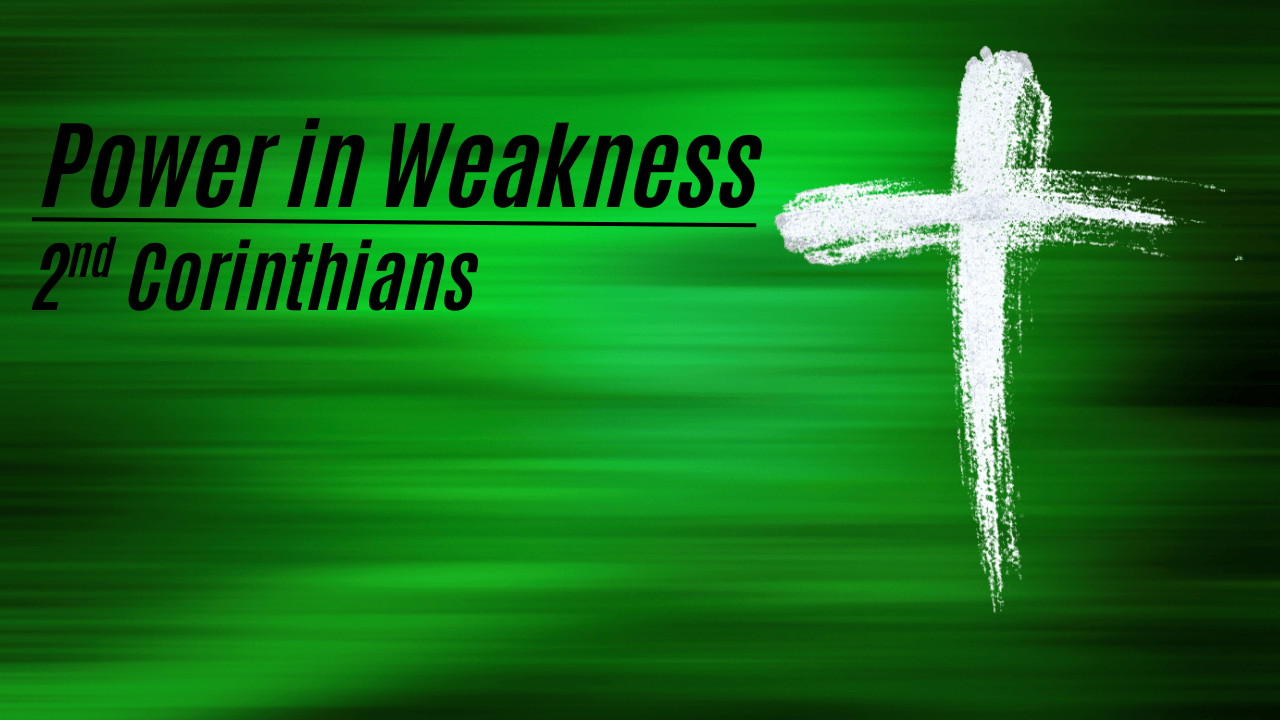
Second Corinthians is Paul’s defense of his love for and love toward the church in Corinth. Paul’s defends his apostolic ministry against critics who question his authority. He recounts profound suffering—beatings, imprisonment, near-death experiences—yet refuses to boast except in his weaknesses. Through personal vulnerability, Paul reveals Christ's power working most effectively in human frailty. He describes his mysterious "thorn in the flesh," where God's response becomes the letter's centerpiece: "My grace is sufficient for you, for my power is made perfect in weakness." Paul embraces this paradox, demonstrating that divine strength flows through broken vessels. His authenticity and struggles validate rather than undermine his ministry, proving that God's power shines brightest through human limitation and dependence.

